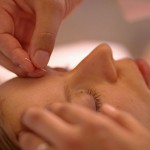Taken from http://acupuncture.com/newsletters 
Have you read the service menu at your favorite spa lately? If so, you may have noticed a new and intriguing addition: cosmetic acupuncture. Cosmetic acupuncture – also known as acupuncture facial rejuvenation or acupuncture facelift – is finding its way into an increasing number of full-service spas, and for good reason. This new modality can enhance not only your physical appearance but also your overall health, giving you a glow that radiates from deep within. While cosmetic acupuncture as a spa feature is a somewhat new phenomenon, there are nevertheless centuries-old records of it being used in the service of beauty. What’s more, acupuncture’s ability to improve a variety of skin conditions has now been documented in legitimate clinical studies. Its effectiveness is no longer a question of hearsay or testimonials. Before signing up for a course of facial acupuncture treatments, however, there are a few things you should consider.
Is it really a facelift? The answer is an unequivocal no. Nor is it intended to replace a facelift. Cosmetic acupuncture entails no incisions, sutures or acid peels and it will not produce sudden, drastic changes in underlying structures. In fact, the American Cosmetic Acupuncture Association discourages the use of the term, “facelift” in connection with acupuncture, as this creates unrealistic expectations and, ultimately, disappointment. Remember, it took decades of stress, sun damage and exposure to environmental toxins for your skin to reach a state of crisis, and the damage will not be instantly undone. The remedy cosmetic acupuncture may offer is the reduction or erasure of fine lines and the softening of deeper ones. Additionally, patients may experience the firming of jowls and a reduction in the size of under-eye bags. It is not unusual for clients to report enhanced skin tone, increased energy and eyes that sparkle.
But it doesn’t stop there. Since facial acupuncture is based on time-tested principles of Traditional Chinese Medicine, a person’s overall health may also benefit. Insomnia may be corrected and weight gain may be controlled. Cosmetic acupuncture is, after all, a whole-body treatment. In the Traditional Chinese Medicine view, a person’s face is affected selectively by his or her internal organs. Facial features reflect organic strengths, and as internal organs are fortified, one’s face reflects the improvement. Besides addressing a patient’s condition holistically, the practitioner will probably work locally, inserting painless, ultra-fine needles into–and around–specific wrinkles, acu-points or muscle points, depending on the technique employed. Techniques can be Spartan or luxuriant, and practitioners will often incorporate herbal poultices, moisturizers, pulsed light or essential oils into a treatment. An imperceptible electrical current may also be passed among the needles.
Finding a Practitioner
Finding certified practitioners may be easier than you think. They are listed by region at the website of The American Cosmetic Acupuncture Association (www.AmericanCosmeticAcupuncture.com). Membership in the ACAA assures you the acupuncturist is licensed and has studied facial cosmetic technique with a qualified teacher (not all of them have). You might want to avoid cosmetic acupuncture practitioners and teachers who claim their technique is better than all others (they may offer testimonials). There are simply too many talented practitioners in the field for anyone to make such a claim ethically.
The practitioner you choose should be willing to provide you with a free fifteen-minute consultation as well as an estimate of the cost and the number of treatments required. A course of ten treatments is standard, with periodic follow-up visits as needed. These sessions are labor intensive and will be priced differently than customary acupuncture treatments. Not surprisingly, if you are a smoker or sun-worshipper, you will need to make a longer commitment in order to achieve results. Depending on the technique used, there is a slight chance of minor temporary bruising, although your practitioner may lessen the possibility by starting your session with a homeopathic remedy.
If your features are tired, your eyes are baggy and your skin is without luster, yet you do not feel the need for cosmetic surgery, then facial acupuncture may be for you. The freedom from post-treatment downtime and the experience of enhanced vitality contribute to the ever-increasing popularity of this Asian art. If you are willing to try something different and new, you may find that facial acupuncture is the perfect partner in your quest for rejuvenation and renewal.
Charles Yarborough, L.Ac. is director of the American Cosmetic Acupuncture Association (www.AmericanCosmeticAcupuncture.com) and of Hamptons Health Circle in Pasadena, CA.